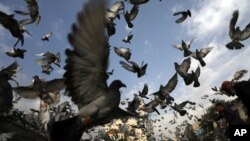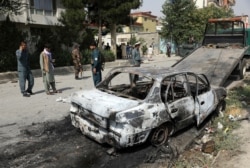Fighting in Afghanistan temporarily subsided Tuesday on the first day of the Muslim festival of Eid al-Adha, as Taliban insurgents said they were observing an unannounced cease-fire to enable Afghans to peacefully participate in the festivities.
While there were no reports of battlefield clashes between Afghan government forces and the Taliban across the country, a rocket attack shattered the capital, Kabul, during early morning prayers, which mark the opening of the three-day Eid celebrations.
The Afghan interior ministry said at least three rockets landed near the presidential palace, where President Ashraf Ghani was offering Eid prayers, along with top government officials. But TV images showed Ghani and most of other worshippers continued praying at the outdoor gathering. No casualties were reported.
The Islamic State’s regional affiliate, known as IS Khorasan Province, claimed responsibility for the attack.
The Taliban have regularly called Eid truces with Afghan security forces since mid-2018, but the insurgent group made no such official announcement for this week’s festivities.
“Every year there is a de facto Eid cease-fire from our side to enable our nation to peacefully and comfortably attend the festivities,” Taliban spokesman Suhail Shaheen told VOA when asked why his group this time did not declare a truce.
“Sometimes we officially announce it and sometimes we don’t. But even when we don’t declare a cease-fire on Eid, practically it is in place,” Shaheen explained.
The Afghan private TOLOnews TV channel said there were no reports of Taliban attacks or clashes in contested districts between the government forces and the insurgents.
“The cessation of fighting allowed Afghans to celebrate the beginning of the holiday with calm,” the network reported.
Insecurity has worsened in Afghanistan as the withdrawal of the United-States-led foreign troops is progressing ahead of scheduled and it should conclude by the end of next month.
The drawdown process is more than 95% complete, but it has encouraged the Taliban to step up attacks and overrun a growing number of Afghan districts as well as key border crossings the landlocked nation has with neighboring countries.
The U.S.-brokered peace talks between the Taliban and Afghan government representatives have not produced any significant outcome.
Top leaders from the two sides met in Doha, Qatar, last week and agreed to accelerate the peace process but did not report any major breakthrough.
Shaheen reiterated Tuesday that the Taliban do not intend to militarily seize power in Afghanistan and want to negotiate a peace arrangement with rival Afghans to end the war.
But Ghani and foreign critics are skeptical of the insurgent pledges.
“We have the resolve for peace, and we are ready to sacrifice for it. But they (Taliban) have no intention, nor they desire peace,” Ghani said in his nationally televised speech following the morning prayers for Eid.
On Monday, foreign diplomatic missions in Kabul also collectively called for the Taliban to urgently cease military offensives, saying they run counter to claims the insurgent group wants a negotiated settlement to the war.
“We continue to call for an accelerated path to a political settlement and an end to the violence,” U.S. State Department spokesman Ned Price told reporters in Washington on Tuesday.
“What we have been consistent in saying is that the people of Afghanistan are united in their desire for a just and for a lasting peace, and that is what the diplomacy we are supporting and much of the international community is supporting is geared to effect.”

